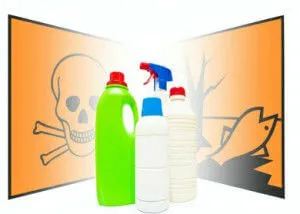Keeping your home clean is essential for the health of you and your family, but harsh chemicals are not a safe solution. There are a number of reasons that more and more people are switching to natural cleaners. The facts about conventional varieties are downright frightening.
1. We Don’t Really Know What’s In them
According to the National Research Council, “less than 20 percent of chemicals in everyday use have been tested for acute effects and less than 10 percent have been tested for chronic, reproductive or mutagenic effects.”
The Toxic Substances Control Act (TCSA) was passed by Congress about 30 years ago, however, the testing of chemical compounds is very limited. The Environmental Protection Agency (EPA) has only tested about 200 of the 80,000 chemicals that are found in home products, including cleaners.
The National Institute of Occupational Safety and Health (NIOSH) reports that about one third of substances used by the fragrance industry are toxic. Moreover, fragrance manufacturers do not have to list the ingredients that they use on labels, as they are considered ‘trade secrets.’ For this reason, be suspect of anything labeled ‘fragrance.’
2. They May Cause Harmful Side Effects
According to the American Lung Association, “household cleaning agents that contain potentially harmful substances that contribute to indoor air pollution are wide-reaching and diverse.” They also explain that household cleaners can cause nausea, dizziness, allergic reactions, eye and skin irritation and respiratory problems, and have even been linked to some cancers.
A number of studies, including research published by the Washington Toxics Coalition, states that many conventional cleaning products may irritate the lungs, burn the eyes and skin, worsen asthma symptoms or even cause death.
3. They are Especially Hazardous to Children
Statistics compiled by the American Association of Poison Control Centers have found that 1.25 million children under six are unintentionally poisoned every year by common household products.
Carpet, oven and other cleaners may contain toluene, chloride, formaldehyde, methylene, ethylene glycol, formaldehyde and nitrobenzene, and the volatile organic compounds (VOCs) found in these cleaners have been linked to asthma in children. Furthermore, a number of household cleaning products have been linked by some studies to leukemia in children.
According to the European Respiratory Journal, pregnant women who use household cleaners may be putting their children at a higher risk of developing asthma. The Environmental Working Group has found 232 different industrial chemicals and pollutants in the umbilical cord blood of newborn babies.

A simple vinegar and water solution is a great way to clean countertops, tables, tile flooring and other surfaces. Combine one part white vinegar with three parts water in a spray bottle, then spray and wipe. To disinfect further, let the vinegar-water mixture sit on the surface for 60 seconds before wiping. For floors, combine the vinegar and water in a bucket, and mop as usual.
Baking soda can be used to clean sinks, appliances, bathtubs and carpets, to name only a few applications. To scrub a sink or tub, make a thick paste using baking soda and water, and scrub with an old toothbrush or scouring pad. for carpets, sprinkle on, let sit for a few moments, and vacuum. Baking soda neutralizes odors, as well.
Hydrogen peroxide is another way to clean and disinfect counters, table tops, refrigerators and mirrors (it won’t leave a streak!). You can use a 3 percent solution straight from the bottle, and then rinse with water. Let sit on a surface for 60 seconds to fully disinfect.
If you clean your home naturally, you will enjoy the benefits of sparkling surfaces, and the peace of mind of knowing you and your family are safe.
-The Alternative Daily
Source:
http://www.growingagreenfamily.com/ten-problems-and-hazards-of-conventional-cleaning-products/
